|
|
|
Sort Order |
|
|
|
Items / Page
|
|
|
|
|
|
|
| Srl | Item |
| 1 |
ID:
107214
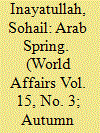

|
|
|
| 2 |
ID:
132900
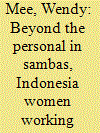

|
|
|
|
|
| Publication |
2014.
|
| Summary/Abstract |
Sambas, a regency in Indonesia's West Kalimantan Province, on the border with Sarawak (Malaysia), provides a distinctive borderlands perspective from which to evaluate the economic and social transformations that accompany Indonesian women's labor mobility. Drawing on village surveys and case studies about women's cross-border activities in Sambas, this article examines the complex inter- section between women's working lives and economic sectors, including those conventionally labeled formal, informal, subsistence, and capitalist. The increasing involvement of young Indonesian Malay women in labor migration has also fostered new marital and familial patterns, which may in turn generate further shifts within the organization of cross-border work and family in the future. These changes illuminate issues of agency and precedence that arise out of local economic histories and family patterns of labor and labor migration. This analysis of both continuities and transformations in women's cross-border labor leads us to attend to women's creative engagement with the opportunities and constraints they face in reaching their personal and economic aspirations. One opportunity, this study shows, was women's proximity to an international border. This location they turned into an economic asset, one that harnessed the productive power of the border.
|
|
|
|
|
|
|
|
|
|
|
|
|
|
|
|
| 3 |
ID:
086485
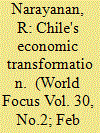

|
|
|
|
|
| Publication |
2009.
|
| Summary/Abstract |
Over the last four decades, Chile has evolved from a slow-growing state-directed economy into a fast-growing market-oriented one, attesting to its success in implementing comprehensive neo-liberal economic reforms. At least three policy conclusions emerge from the delineation of Chile's economic transformation trajectory.
|
|
|
|
|
|
|
|
|
|
|
|
|
|
|
|
| 4 |
ID:
142185
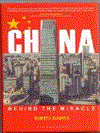

|
|
|
|
|
| Publication |
New Delhi, Bloomsbury Publishing India Pvt Ltd, 2015.
|
| Description |
239p.hbk
|
| Standard Number |
9789385436345
|
|
|
|
|
|
|
|
|
|
|
|
Copies: C:1/I:0,R:0,Q:0
Circulation
| Accession# | Call# | Current Location | Status | Policy | Location |
| 058404 | 338.951/DAW 058404 | Main | On Shelf | General | |
|
|
|
|
| 5 |
ID:
129887
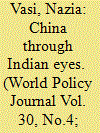

|
|
|
| 6 |
ID:
144792
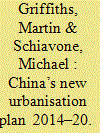

|
|
|
|
|
| Summary/Abstract |
Since 1978, China has emerged from being a predominantly agricultural economy to become the world’s largest economic power. Over the same period, the proportion of its population living in cities has more than doubled, from one fifth of the population in 1978 to more than half the population. Today, one tenth of the world’s population lives in Chinese cities. Over the past few years, there has been a growing concern over the sustainability of China’s economic development, which confronts a host of challenges, both external and internal. In light of those challenges, it has been suggested by many commentators that, among other policy changes, China will have to shift from its dependence on exports to a greater focus on domestic consumption. In this article we suggest that what has been dubbed the ‘new urbanisation’ by Chinese authorities is a useful lens through which to assess both the opportunities and challenges facing China as it navigates a path to more sustainable economic growth over the next few decades. It also provides a counterbalance to those commentators who focus solely on China’s growing military power as evidence of a rising China compared to the United States.
|
|
|
|
|
|
|
|
|
|
|
|
|
|
|
|
| 7 |
ID:
138900
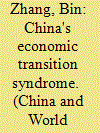

|
|
|
|
|
| Summary/Abstract |
Following 30 years of high economic growth, China's economy is in the midst of a classic transition from an industrial to a post-industrial economy. In this transition period, the mismatch between supply and demand is growing, while the country's economic growth engine is weakening. Stimulus policies have aimed to maintain the country's economic growth momentum but they have come at the price of sharply increased financial fragility and resource misallocation, both of which are harmful to economic growth. China's “economic transition syndrome” refers to the vicious cycle of slowing GDP growth, combined with increasing demand for stimulus policies, and increasing financial fragility and resource misallocation.
|
|
|
|
|
|
|
|
|
|
|
|
|
|
|
|
| 8 |
ID:
129627
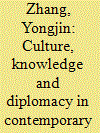

|
|
|
|
|
| Publication |
2014.
|
| Summary/Abstract |
The worlds that Matteo Ricci lived in-early modern Europe, Ming China and the pre-Westphalian international order-are vastly different from the world of the 21st century, when accelerated globalization binds China and Europe together as never before and when global international society is moving decisively beyond Westphalia. How much are the legacies of Matteo Ricci still relevant, 400 years on, to enriching the relationship between China and Europe in the 21st century? This paper starts with a brief overview of the civilizational encounters between China and Europe and the unfolding of their turbulent and often troubled relationship over the last four centuries of wars, collapse of empires, internal convulsions, nation-state building, scientific and industrial revolutions and great economic transformations. Against this historical narrative is the discussion of Matteo Ricci as a cultural agent, a knowledge broker and a practitioner of public diplomacy in fostering Sino-European relations in its nascent years. The paper argues that even in an increasingly globalized world, Matteo Ricci's conception of culture, his wisdom about the power of knowledge and his practice of people-to-people diplomacy remain valuable in informing both China and the EU, two aspiring global players, in their search for a viable China-EU strategic partnership.
|
|
|
|
|
|
|
|
|
|
|
|
|
|
|
|
| 9 |
ID:
151325
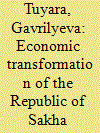

|
|
|
| 10 |
ID:
170173
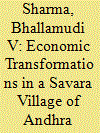

|
|
|
|
|
| Summary/Abstract |
Even tribal communities in India living in relative geographic isolation have experienced significant transformations during the last 70 years. Many studies have investigated the impact of tribal development programmes on the socio-economic conditions of different tribal communities. However, few attempts to systematically re-study the same tribal village after some decades have been made. This article re-examines the transformation of different sources of income for a Savara village in Andhra Pradesh and specifically scrutinises the impact of cashew plantations promoted in 1983–5. Since the acceptance to undertake cashew plantation was a precondition for the Savara of Manapuram to achieve economic and language integration, the question becomes what have been the results after some decades. The article identifies many consequences for this community, not just a shift from tamarind to cashew.
|
|
|
|
|
|
|
|
|
|
|
|
|
|
|
|
| 11 |
ID:
119237
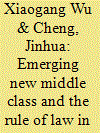

|
|
|
| 12 |
ID:
108540
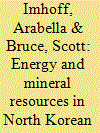

|
|
|
|
|
| Publication |
2011.
|
| Summary/Abstract |
Addressing the DPRK nuclear weapons issue requires that the DPRK rebuild its
economy in peaceful ways that avoid illicit or sanctioned activities. Two major
components of this economic transformation are the state's mineral sector and
energy sector, which must have the infrastructure to support economic growth.
Accurately assessing the DPRK energy and mineral sectors is challenging, given
the significant amount of inaccurate data on the subject. However, unless such
policy-relevant data and analysis can be generated, it is impossible for decisionmakers to determine how to engage the DPRK in a meaningful way. From a
DPRK perspective, such analysis is equally critical because it is evident that substantial rehabilitation of the energy sector and development of the mineral sector
is impossible without external assistance. The following papers contained in this
special edition of the KJDA outline the status of the energy and mineral sectors
and paint a bleak picture of North Korea: a decaying energy infrastructure, mines
lacking adequate supplies and fuel, and a crippled energy sector unable to support
commercial development that now functions at a fraction of its output 20 years
ago. However, three options for engaging the DPRK are available: 1) Cooperative
energy efficiency projects in the DPRK. 2) Working with the DPRK to ensure
that the pilot light water reactor at Yongbyon complies with proper design and
construction standards. 3) Assisting the DPRK with minerals-sector development,
including providing markets for the minerals produced.
|
|
|
|
|
|
|
|
|
|
|
|
|
|
|
|
| 13 |
ID:
118876
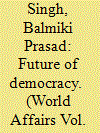

|
|
|
| 14 |
ID:
130384
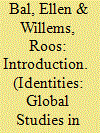

|
|
|
|
|
| Publication |
2014.
|
| Summary/Abstract |
This special issue addresses the imagination of futures 'away from home' in a globalising world. While a growing number of migration scholars have taken into account that migration considerations are always socially embedded and culturally informed, the processes at work among a mounting number of (young) men and women throughout the world, who are convinced that a better life can only be found 'away from home', have been notably understudied. This special issue goes beyond the study of migration aspirations as a question of migration only. It focuses on the specific contexts (in five different countries) within which migration dreams are born, and sometimes even cultivated. It explores the sociocultural embedding of these aspirations by investigating the interpretation of local realities versus global possibilities, and examines how the aspirations of so many worldwide link up to the wider interconnections between globalisation and the sociocultural, political and economic transformations 'back home'.
|
|
|
|
|
|
|
|
|
|
|
|
|
|
|
|
| 15 |
ID:
168296
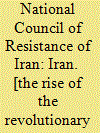

|
|
|
|
|
| Publication |
Washington, DC, NCRI, 2017.
|
| Description |
173p.hbk
|
| Standard Number |
9781944942021
|
|
|
|
|
|
|
|
|
|
|
|
Copies: C:1/I:0,R:0,Q:0
Circulation
| Accession# | Call# | Current Location | Status | Policy | Location |
| 059735 | 955/NAT 059735 | Main | On Shelf | General | |
|
|
|
|
| 16 |
ID:
109841
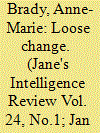

|
|
|
| 17 |
ID:
174645
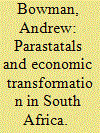

|
|
|
|
|
| Summary/Abstract |
This article analyses the causes, outcomes, and political significance of the inter-connected operational, financial, and governance crises afflicting Eskom, South Africa’s electricity parastatal. These crises emerged in the context of African National Congress initiatives to turn Eskom and other key parastatals into instruments of an envisaged South African developmental state, through increased investment and strategic procurement to support economic transformation goals. Instead, Eskom’s spiralling costs, procurement irregularities and inability to translate increased investment into functional new infrastructure meant it impeded these goals. Its indebtedness became a severe macro-economic risk, making Eskom a precarious nexus for the circulation of public funds, while the cost and unreliability of electricity has undermined South Africa’s energy-intensive industrial core. Intertwined with this were multiple high-profile corruption scandals associated with the ‘state-capture’ controversies of the latter stages of Jacob Zuma’s presidency. The article argues that Eskom’s extreme dysfunctionality results from long-running, and as yet unresolved, contestation of the parastatal and electricity policy more broadly by various interest groups, in a context of an increasingly fragmented political and business elite. This created a range of incoherent distributional pressures and institutional constraints. Rather than a straightforward outcome of corruption and ‘state capture’, this reflects deeper tensions in the post-apartheid political economy.
|
|
|
|
|
|
|
|
|
|
|
|
|
|
|
|
| 18 |
ID:
154418
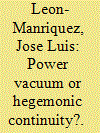

|
|
|
|
|
| Summary/Abstract |
This article argues that the gradual decline of the United States’ economic presence in Latin America—and particularly in South America—reads as a manifestation of Washington’s hegemonic attrition in the world. Indeed, concerns over the Chinese incursion in Latin America and the increase of the pressures of the American hard line could transform the region into a scenario of geopolitical dispute between the two great powers. I first analyze the history of the relations between the United States and Latin America, which have followed a complex trajectory of interest, coercion, consensus, and carelessness. I then focus on bilateral relations since the 1990s and specify the political and economic transformations of Latin America in the first years of the twenty-first century and the consequent paralysis of the United States to understand these changes. The article then summarizes the contours of the dynamic commercial relations between Latin America and China, an emergent actor in the region. I conclude with an examination of the U.S. responses to Chinese presence in the Western hemisphere.
|
|
|
|
|
|
|
|
|
|
|
|
|
|
|
|
| 19 |
ID:
134043
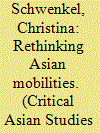

|
|
|
|
|
| Publication |
2014.
|
| Summary/Abstract |
Vietnam's economic reforms have generated much praise for the country's rapid "opening" of its markets, as if the Vietnamese nation had previously existed in a state of isolation, closed to broader global influences and exchanges. Such discourses overlook the importance of transnational circulations of people, goods, technologies, and expertise during the socialist era that were vital to Vietnam's postwar national reconstruction and continue to play a role in post-socialist economic transformation today. This article traces the socialist pathways of labor migration between Vietnam and the former Soviet Bloc (specifically, East Germany) in the 1980s, mobilities that are generally absent in studies of contemporary export labor industries. Based on multi-sited ethnographic and archival research, the author follows Vietnamese workers first to the East German factories where they labored as "contract workers," and then through their subsequent return and reintegration into Vietnamese society after the collapse of the Soviet Union. These mobilities bespeak of an alternative history and formation of diasporic communities that are little acknowledged or addressed in literature on labor migrations, and yet are important to understanding emerging forms of stratification today in Vietnam. Moreover, an analysis of early non-capitalist experiences with overseas labor regimes in the 1980s provides insights into contemporary Vietnamese governance practices that promote-rather uncritically, similar to other "emerging countries" -export labor as a nation-building strategy to reduce endemic poverty and develop a late socialist country.
|
|
|
|
|
|
|
|
|
|
|
|
|
|
|
|
| 20 |
ID:
140195
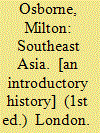

|
|
|
|
|
| Edition |
1st ed.
|
| Publication |
London, George Allen and Unwin, 1979.
|
| Description |
205p.hbk
|
| Standard Number |
0868613762
|
|
|
|
|
|
|
|
|
|
|
|
Copies: C:1/I:0,R:0,Q:0
Circulation
| Accession# | Call# | Current Location | Status | Policy | Location |
| 021766 | 959/OSB 021766 | Main | On Shelf | General | |
|
|
|
|
|
|
|
|
|